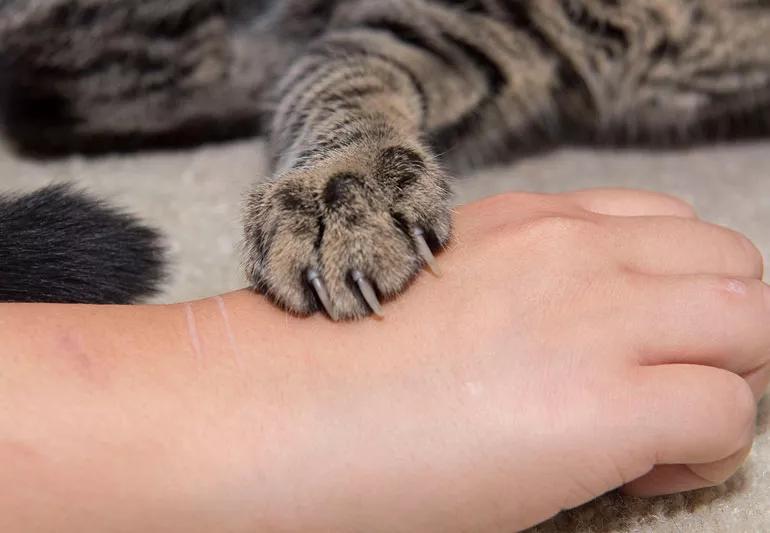Act quickly to cut your infection risk

Image content: This image is available to view online.
View image online (https://assets.clevelandclinic.org/transform/e4950837-6835-4f1f-96ba-42871cde98c5/catScratch-YKL-092920-770x553-1_jpg)
cat scratch
Cats are loved and respected by many cultures across the world. These adorable, fluffy creatures provide emotional support for their owners and can help improve moods in the form of animal therapy.
Advertisement
Cleveland Clinic is a non-profit academic medical center. Advertising on our site helps support our mission. We do not endorse non-Cleveland Clinic products or services. Policy
However, they can also bite or scratch if spooked or if they get defensive. Their razor-sharp teeth and nails can puncture deeply, sometimes penetrating tissues, ligaments and tendons.
While domestic indoor and outdoor cats are usually vaccinated against certain bacteria and infections, stray cats (and sometimes even your domestic cat) can certainly carry bacteria. When these cats bite or scratch you, the clock starts to tick.
“See a doctor within eight hours to cut your infection risk,” says emergency medicine physician Stephen Sayles III, MD. “You may need intravenous, or through the vein, antibiotics or, in some cases, you may even need to be hospitalized.”
Infections can be severe, particularly for people with diabetes or those who are immunocompromised, and their infection risk is even greater.
Cats can introduce staphylococcus aureus, campylobacteriosis or pasteurella bacteria into your body.
Staphylococcus aureus is commonly found on the skin of humans and animals and is spread between humans and animals through touching, according to the Centers for Disease Control and Prevention (CDC). Be aware that cats don’t often show signs of this infection, so it may be hard to tell just by looking at it.
Advertisement
People can contract the campylobacter infection by coming into contact with an infected cat’s poop or through contaminated water or food. If you contract the campylobacter infection, symptoms may include stomach cramps, fever, nausea and diarrhea.
“If you contract pasteurella bacteria after a cat bites or scratches you, initial signs of infection can appear in a few hours,” says Dr. Sayles. “Hands, joints and tendons are at greatest risk.”
People can also contract cat scratch fever, also called cat scratch disease (CSD). This comes from cats infected with Bartonella henselae bacteria from flea bites, blood transfusions or fighting with other infected cats. A bite, scratch or even the saliva of an infected cat can pass it along.
While it may be difficult to avoid petting unfamiliar cats (who can resist those sweet meows?), the CDC recommends being cautious with them, even if they seem friendly. This will help decrease your risk of contracting an infection. Always remember to wash your hands after touching or playing with a cat and after cleaning their litter box.
First, you want to try to flush out as much bacteria as possible and then irrigate the wound with water.
Next, wash the wound with mild soap and water. Slow the bleeding with a clean cloth and apply over-the-counter antibiotic cream if you have it. Then, wrap the wound in a sterile bandage. Keep the wound bandaged until you see your doctor.
“After you see your doctor, change the bandage several times a day,” he says. “Watch for signs of infection, including redness, swelling, increased pain and fever.”
“Cat wounds most often are left open to heal,” says Dr. Sayles. “This makes cleaning the wound easier for you and reduces infection risk.”
Your doctor will likely do the following:
Remember, it’s important to act quickly if you get a cat bite. Call your doctor as soon as possible to help cut the risk for infection.
Advertisement

Sign up for our Health Essentials emails for expert guidance on nutrition, fitness, sleep, skin care and more.
Learn more about our editorial process.
Advertisement
It could be from dry skin, bacteria or ingrown hairs
Practicing good hygiene is your best defense
Signs and symptoms of staph and MRSA infections
Most recommended precautions center around minimizing bruising or swelling
Even one drink can have an impact on your cognitive function leading to slurred speech, blurred vision and impaired memory
Understand who may (and may not) benefit
Type 2 diabetes isn’t inevitable with these dietary changes
Applying a hot or cold compress can help with pain
Pump up your iron intake with foods like tuna, tofu and turkey